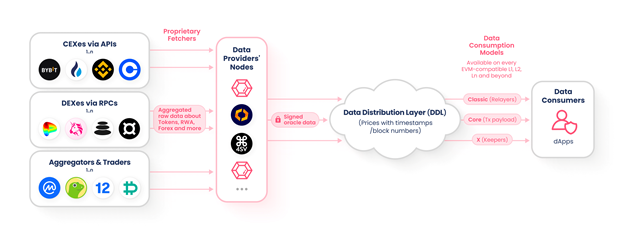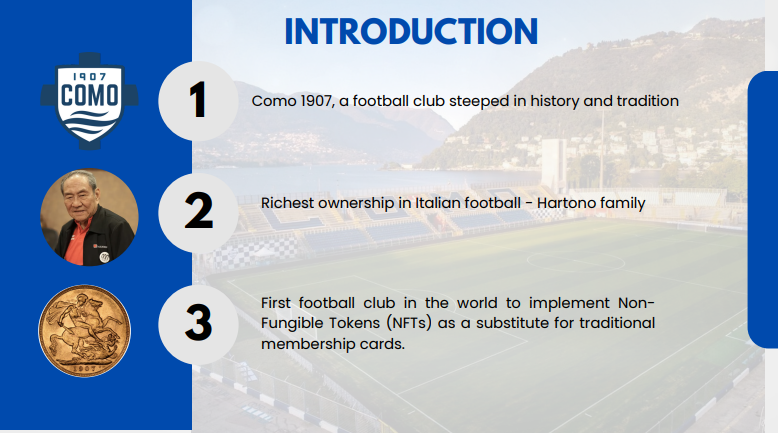Enter RedStone, an Oracle solution that stands at the forefront of delivering frequently updated, reliable, and diverse data feeds for dApps and smart contracts across multiple Layer 1 and Layer 2 blockchain networks. RedStone's innovative approach offers a paradigm shift in how DeFi protocols interact with external data sources, providing a robust and efficient solution for data integration and delivery.
Since my arrival, RedStone has gained significant popularity in the DeFi community, with notable partnerships and endorsements highlighting its credibility and trustworthiness. For example, on the project’s Twitter they posted a photo with the EigenLayer partnership as well as ABDK Peckshield AltLayer Monad and many others This partnership highlights RedStone's ability to drive growth and innovation in the DeFi ecosystem, opening up new possibilities and opportunities for decentralized finance.

RedStone boasts a modular architecture that preserves data integrity from source to smart contracts, ensuring the accuracy and reliability of the information being utilized by DeFi protocols. With three different integration options tailored to the specific needs of users, RedStone offers flexibility and customization to suit various use cases. Moreover, RedStone provides data feeds for over 1000 assets, integrating data from approximately 50 sources, and is compatible with more than 20 blockchain networks, ensuring widespread accessibility and compatibility.
RedStone's design is tailored to the specific requirements of modern DeFi protocols, offering a range of features and functionalities that set it apart from traditional Oracle solutions. One of its key advantages lies in enabling data providers to bypass the need for continuous on-chain data delivery, streamlining the process and reducing overhead costs.
At the heart of RedStone's architecture is the decentralized Streamr network, which serves as the backbone for delivering signed Oracle data to end users. By leveraging this distributed infrastructure, RedStone ensures the reliability and resilience of its data feeds, mitigating the risk of centralized points of failure.
Role of Oracle systems
In the rapidly evolving decentralized finance (DeFi) environment, the role of Oracle systems is of paramount importance. Oracles act as bridges between blockchain networks and external data sources, providing critical information to smart contracts and dApps. However, traditional Oracle systems face numerous challenges, including resource inefficiencies, scalability limitations, and dependence on centralized entities. Recognizing these challenges, the RedStone team set out to develop an innovative solution that addresses the shortcomings of existing Oracle systems and addresses the needs of modern DeFi protocols.
The RedStone solution is based on a modular architecture that ensures data integrity from the source to smart contracts. This modular approach enables seamless integration with various blockchain networks and data sources, providing users with unprecedented flexibility and customization.
One of the main drawbacks of traditional Oracle systems is the indiscriminate transmission of data on-chain, whether it is used or not. This approach wastes a lot of resources and contributes to network congestion. Additionally, the legacy and monolithic architecture of many Oracle systems creates scalability issues, making it difficult to add new assets or reduce latency.
RedStone introduces several key features that differentiate it from traditional Oracle systems:
Avoiding continuous on-chain data delivery: RedStone allows data providers to avoid the need for continuous on-chain data delivery, reducing resource consumption and network congestion.
Self-service delivery of signed Oracle data. End users have the ability to independently deliver signed Oracle data across the chain, increasing decentralization and reducing dependency on intermediaries.
Leveraging the Streamr Decentralized Network: RedStone uses the Streamr decentralized network to deliver signed Oracle data to end users, ensuring reliability and resiliency.
Token Incentives for Data Providers: RedStone incentivizes data providers to maintain data integrity and uninterrupted service through token incentives, helping to create a vibrant and sustainable ecosystem
Supported Chains
RedStone Oracles are available on all EVM-compatible L1s & L2s + Starknet + Fuel Network. Potentially you can use it on any other chain but it would require some custom development.
The following EVM chains are supported
-
Ethereum
-
zkSync Era
-
Polygon zkEVM
-
Arbitrum
-
Polygon PoS
-
Optimism
-
Avalanche
-
Celo
-
Canto
-
BNB Chain
-
Fantom
-
Kava
-
Evmos
-
Gnosis
-
Rootstock (RSK)
-
And many more...
Tokenomics Overview for RedStone
Important Notice: The RedStone token is not yet launched. Please be cautious of scammers and individuals attempting to sell RedStone tokens.
Token Functionality:
The RedStone token serves as a crucial tool for enabling the provision of reliable and accurate information from external sources to blockchain networks.
Token Usage:
Tokens play a vital role in fostering coordination within distributed systems and aligning incentives among various participants. RedStone facilitates a data-sharing ecosystem by incentivizing contributors to generate, publish, and validate data consistently and conscientiously.
Locking Mechanism:
Providers are required to publish a Service Level Agreement detailing the scope of data served, its source, and update frequency. In cases where a provider breaches the terms, penalties are imposed in tokens. To instill confidence in users regarding future claims, providers must allocate a certain number of tokens and lock them for a predetermined period. These locked funds remain within the ecosystem and serve as a crucial criterion for users when selecting the most reliable provider.
Dispute Resolution:
Given the diverse nature of the data provided, disputes over data quality may arise. To address this, a fallback procedure for dispute resolution is essential. Token-based mechanisms can be employed, where jurors are rewarded for aligning with the majority decision and penalized for supporting the losing side.
Market Bootstrapping:
During the initial stages of development, tokens may be distributed to providers as a reward for their participation, thereby bootstrapping the market until there is sufficient demand from data users.
Overall, the tokenomics of RedStone are designed to incentivize data sharing, ensure data integrity, and promote a robust and reliable ecosystem for accessing external information on blockchain networks.
Guidelines for Security Measures
Exercise caution when modifying the getUniqueSignersThreshold function, unless you are absolutely certain about the changes.
Be vigilant about timestamp validation logic, especially in scenarios such as synthetic DEX, where caching the latest values in contract storage is essential to prevent arbitrage attacks.
Implement a secure upgradability mechanism for your contract, preferably based on multi-sig or DAO, to ensure flexibility and resilience against potential vulnerabilities.
Regularly monitor the RedStone data services registry and promptly adjust signer authorization logic in your contracts in response to any changes. As a paying client, you will also receive notifications from us regarding any updates.
Recommendations
Aim to design your contracts in a manner that minimizes the need for requesting multiple data feeds within the same transaction.
Consider utilizing approximately 10 required unique signers, striking a balance between security and gas cost efficiency.
Benchmarks
For further insights into performance metrics, you can refer to the benchmarks script and reports available here.
In conclusion, I described the main points in this blockchain RedStone represents a paradigm shift in Oracle design, offering a comprehensive and innovative solution to the problems faced by traditional Oracle systems. With its modular architecture, decentralized infrastructure, and focus on data integrity and user empowerment, RedStone is poised to drive the evolution of DeFi and open up new opportunities for decentralized finance. In the next article I will try to tell you in detail about the ambassador program of this project




评论 (0)